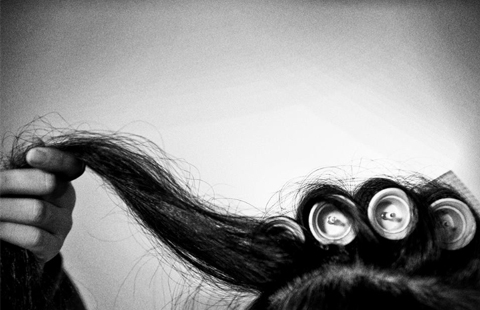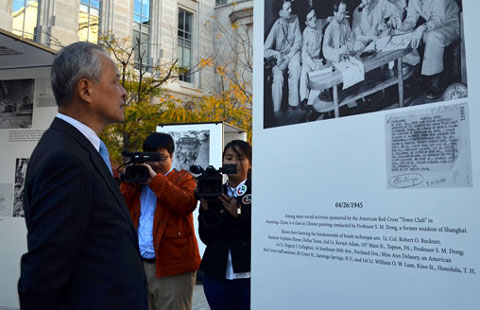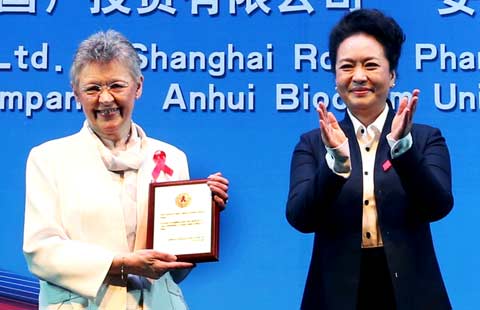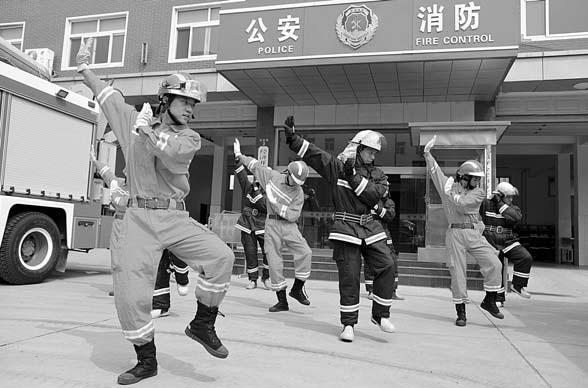Little Apple worms its way to music fans
Updated: 2014-10-21 14:25
By AFP(China Daily USA)
|
||||||||
Has China found its own Gangnam Style? From Beijing parks to Shanghai skyscrapers, and from Guangzhou factories to karaoke rooms in Macao, people are singing Little Apple - a song apparently so catchy it has even won over the army and police.
Calling themselves the Chopstick Brothers, Xiao Yang and Wang Taili are neither brothers nor composers, but are responsible for a hit that has become a nationwide phenomenon.
Xiao Pingguo (Little Apple) was originally intended to promote their latest film when it was released in July, but it has proved to be an "earworm" - the kind of song that's so insistent it gets stuck in the brain.
"This song is easy to follow, the pace is basic and repetitive. Even the old ladies in public gardens are learning it quickly," said Zeng Qiumei, a marketing manager from Sichuan province.
The accompanying music video has notched up more than 50 million views on Chinese video sites such as Sohu, iQiyi and Youku.
The lyrics are largely nonsense, with the chorus running, "You're my little apple, you're my little apple".
Even so, the tune has become ubiquitous - whether playing on smartphone ringtones or in shopping malls, nightclubs and gyms.
Words changed
The People's Liberation Army in the city of Xi'an has used the song in a recruitment video, while police in Shandong last month modified the lyrics for a broadcast warning about phone-banking scams.
"We changed the words to make people aware," a police officer said in comments broadcast on CCTV.
And a clip showing soldiers dancing to Xiao Pingguo with child survivors of an August earthquake that killed 600 people in the southwest became an online sensation.
There are countless other amateur videos of groups of people dancing to the song, including flight attendants, cheerleaders, firefighters and students.
The song's success has also put a spotlight on dama -the old ladies who gather every morning and evening to dance in city squares across China.
Zheng Xiaomin, a 76-year-old retiree in Beijing, said the Xiao Pingguo dance phenomenon has brought more people together, although she was happy to remain a spectator.
"In a park, it is usually embarrassing to be seen putting your hands on the shoulder or hip of a partner," the former typographer said.
"But with Xiao Pingguo, that's not the case."
Not K-pop
Despite its nationwide appeal, there are few expectations that Little Apple will become the kind of global phenomenon that was Gangnam Style, the stratospheric 2012 hit by South Korea's Psy that has been viewed on YouTube more than 2.1 billion times.
Experts say Xiao Pingguo lacks the Westernized ingredients that helped Psy find such success.
Chinese pop music has remained within its borders - unlike K-pop, which has assimilated various influences to help it conquer Southeast Asia and Japan, as well as gain attention beyond the continent, said Chinese music critic Hao Fang.
"China does not focus on the development of its cultural and creative industries" in the way that South Korea does, he said.
"The songs are stylistically outdated. Xiao Pingguo takes on a disco beat heard in the 1980s and 1990s in China, which prevents it from competing with current pop music from the rest of the world," said Fang.
"And for all its mass appeal, it seems that the song still has a long way to go before it wins the hearts and minds of the state."
|
Firefighters in Handan, Hebei province, danced to the song of Xiao Pingguo (Little Apple) whose lyrics were modified with advice about fire safety in August. Hao Qunying / For China Daily |
(China Daily USA 10/21/2014 page6)

 Yang Jiechi meets with US National Security Advisor
Yang Jiechi meets with US National Security Advisor
 Chinese power couple's art on display at UN
Chinese power couple's art on display at UN
 Lenses on wedding: From me to us
Lenses on wedding: From me to us
 Cui Tiankai visits exhibition on WWII
Cui Tiankai visits exhibition on WWII
 The capital's biggest pizza party
The capital's biggest pizza party
 China, Russia hold anti-terror drill
China, Russia hold anti-terror drill
 Highlights of Shanghai Fashion Week
Highlights of Shanghai Fashion Week
 Step up the battle against HIV/AIDS, urges first lady
Step up the battle against HIV/AIDS, urges first lady
Most Viewed
Editor's Picks

|

|

|

|

|

|
Today's Top News
New services for Chinese small businesses
PBOC official gets ready 'to assume helm' at ABC
China launches remote sensing satellite
Treasured Chinese scroll may be missing from estate
Step up the battle against HIV/AIDS, urges first lady
HK court orders end to protest
Game on for a healthy sports industry
Property oversupply to be digested at most within 2 years
US Weekly

|

|







